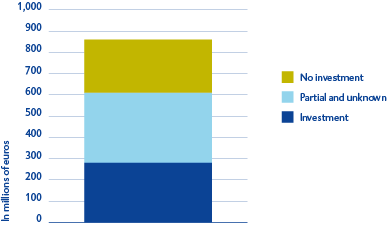Investments in higher education
Research universities and universities of applied science collectively gave the Minister of Education, Culture and Science an undertaking to invest an additional €600 million in the quality of higher education in the period 2015-2017. The investments will be made in anticipation of the funding released by the student loan system. So that students could have a say in the investments, student councils were given a right of consent regarding the main points of the universities’ budgets. This audit considered whether the undertaking had been kept and whether the right of consent had worked.

Higher education sector unlikely to invest promised €600 million
The universities are unlikely to have made the promised €600 million investment in the quality of higher education in full.
For the purposes of our audit, the universities informed the Court of Audit of the investments they had made. Their additional investments in the quality of education in the period 2015-2017 came to a total of €860 million. The Court checked whether the investments had met the criteria of the undertaking to make new and additional investments for the benefit of students in 2015-2017 given by the Association of Universities in the Netherlands (VSNU) and the Netherlands Association of Universities of Applied Sciences.
We found that only a third of the stated €860 million (i.e. €280 million) had been made in order to fulfil the undertaking. About €250 million (29%) did not satisfy the criteria. No conclusions could be drawn regarding the remaining €330 million (38%).
Higher education sector unlikely to invest promised €600 million

Right of consent open to improvement
The Court of Audit also considered whether the student councils’ right of consent regarding the main points of the budgets had worked. We concluded that some progress had been made but the councils did not yet have a say in decision-making at an early stage. If the right to vote on the main points of the budgets is also to work in respect of the student loan system, the universities still have a great deal of work to do.

Why did we audit investments and student councils in higher education?
The grant system for students at research universities and universities of applied science was replaced In September 2015 with a system in which students could take out loans on soft terms. One aim of introducing the student loan system was that the funds that were released could be used to make additional investments in the quality of education.
To give students a say in the use of the additional funds, university student councils have had a right to vote on the main points of the universities’ budgets since 2016. The aim was to encourage a meaningful dialogue with the university managers at an early stage in the decision-making.
As students have been affected by the abolition of grants since 2015 but the funds released by the loan system will not become available until 2018, the VSNU and the Netherlands Association of Universities of Applied Sciences gave an undertaking, at the minister’s request, that the universities would collectively invest €600 million in the quality of higher education in the years 2015, 2016 and 2017. The universities of applied sciences would invest two thirds of the total and the research universities one third. The institutions would make the investments on the assumption that funds released from the student loan system would make up for the “holes” made by the investments in their financial positions.
In the same period, student councils were granted the right to vote on the main points of the universities’ budgets. The audit looked at how this right has been exercised with regard to the investments made in the period 2015-2017 in anticipation of the student loan system.

What standards and methods did we use in our audit of investments and the right of consent in higher education?
Our audit considered an expenditure to be a qualifying investment if:
- a decision had been taken to do something extra (i.e. something that had not been budgeted); or
- the expenditure had initially been planned for a later year and had been brought forward; or
- more money had been spent (additional expenditure) than had previously been budgeted; and
- the expenditure had not been subsidised but was funded from the university’s own resources; and
- the expenditure was not at the expense of ongoing quality plans and expenditures; and
- the expenditure also contributed to the quality of education in 2015, 2016 and/or 2017, i.e. for the benefit of current students.
Exercise of right of consent:
- Regulations have been drawn up, with the approval of the student councils, laying down the right to vote on the main points of the budget (Higher Education and Research Act, section 9.34).
- The regulations were introduced in time for the student councils to vote on the main points of the 2016 budget.

Current status
The Minister of Education, Culture and Science, the Intercity Student Council (ISO), the Dutch Student Union (LSVb) – including the Student Representation Council (SOM) and the National Assembly of University Parties (LOF) – the VSNU and the Netherlands Association of Universities of Applied Sciences commented on our draft report on 19 December 2017. The National Association of University Representation Councils (LOVUM) responded on 20 December 2017 and the Association of Universities of Applied Sciences Representation Council (VMH) on 15 December 2017. Their letters can be read in full (in Dutch) on our website, www.rekenkamer.nl.